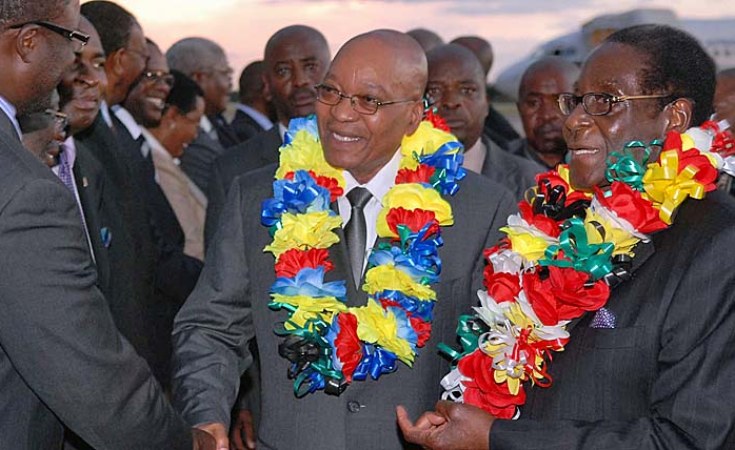Cape Town — Close allies of President Robert Mugabe have responded to criticism from Zimbabwe's neighbours by launching unprecedented, scathing attacks on South African President Jacob Zuma.
After a Southern African Development Community (SADC) meeting last week heard a report from Zuma - the regional grouping's facilitator over talks on Zimbabwe, regional leaders issued a communique condemning what they called the current "violence, intimidation, hate speech [and] harassment" in Zimbabwe.
The leaders, who included presidents Rupiah Banda of Zambia, Hifikepunye Pohamba of Namibia and Armando Guebuza of Mozambique, thanked Zuma for the "frankness" of his facilitator's report and declared their "impatience" at the delays in fully implementing the "Global Political Agreement" establishing Zimbabwe's unity government.
Back in Harare on Friday, Mugabe criticized Zuma, implicitly accusing him of presribing to Zimbabwe.
Mugabe told his party: "As a sovereign State we don't accept any interference and even our neighbours should not tell us what to do."
Referring to Prime Minister Morgan Tsvangirai's tour across southern Africa, lobbying the region's presidents to stop violence being inflicted on his supporters, Mugabe said: "I asked them which country is free of that conflict... In any third world or developing country, there are always conflicts but you don't judge them on that."
Mugabe's protests were followed on Sunday by an editorial in the pro-Mugabe Sunday Mail newspaper, which is not known to take stands opposed to Mugabe's wishes, which accused "the disaster-prone Zuma" of "erratic behaviour", "astounding" duplicity, and of taking a "ludicrous stance" on Libya by making remarks which "would have shocked any self-respecting African."
On Zimbabwe, the Mail charged Zuma with being a "a dishonest broker... His role is not to meddle and dictate." The newspaper also published a commentary by Jonathan Moyo, a member of Parliament for Mugabe's Zanu-PF, complaining that Zuma's report was not given to the Zimbabwean delegation "before, during or after the summit."
Moyo also said the SADC leaders kept Mugabe waiting all day last Thursday, "until 8pm when the official session was convened for no more than an hour during which the troika reported its decisions without much dialogue..."
Moyo took particular exception to a SADC decision to appoint a team of officials to work with Zimbabwe's unity government structures in jointly monitoring, evaluating and implementing the GPA.
Such a group would be "nothing but a bunch of regime-change spies deployed to distort things and lie about Zimbabwe," Moyo said. The SADC initiative was "a clear and evil attempt to open a treacherous window for regime change donors to trample on our sovereignty in the vain hope of influencing the organisation and outcome of the forthcoming general election."


